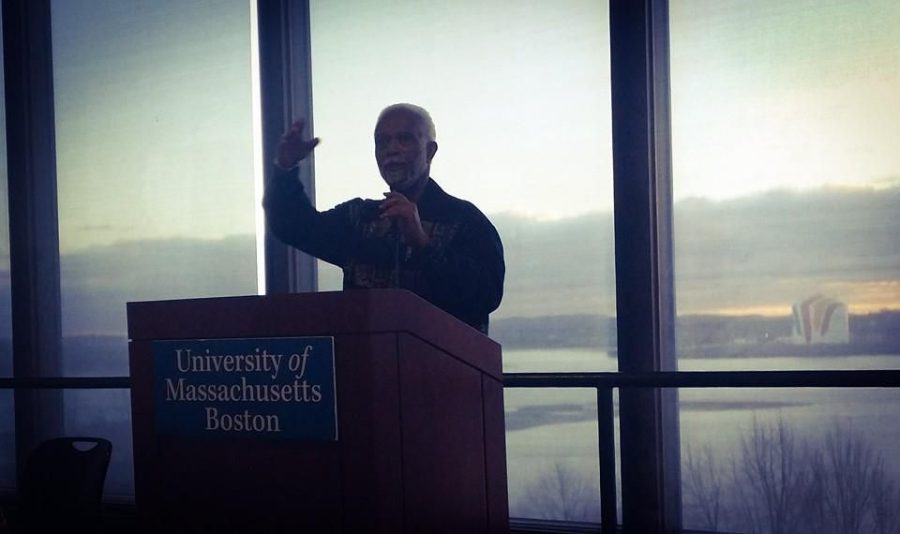The Center for African, Caribbean and Community Development held its 18th annual Martin Luther King/Amilcar Cabral commemorative program at the University of Massachusetts Boston in the Ryan Lounge on Jan. 19.
The program, which was entitled “Education for Liberation,” had many participants leaving the lounge with a passion for social justice and a feeling of empowerment.
“When we talk about the education for liberation, we have to begin to deal with the contradiction around the notion of the oppressed and the oppressors,” said Africana Studies Professor Anthony Van Der Meer.
“If we are not dealing [with] this contradiction, then we are not dealing with our history at all,” added Van Der Meer. He proceeded to offer a libation of water to invoke Dr. King and Cabral’s spirits.
Martin Luther King was an African American civil rights leader. He is best known for his role in the development of civil rights using non-violent civil disobedience based on his Christian beliefs. Amical Cabral was a nationalist thinker. He led the movement of opposing the ruling dictatorship of Portugal and promoting the cause of liberation of the Portuguese colonies in Africa.
“These were two young men who wanted to change life and the structure of the society,” explained Van Deer Meer. These men were dedicated to the fight for racial equality, equity with decency, and social justice. “They hated the oppressive system,” said Van Deer Meer.
“But the structure they fought [against] is still broken,” he lamented. Economic inequality is still prevalent in our society. Injustice against minority groups is still occurring on a daily basis.
Professor Van Der Meer explained the most important question to ask ourselves is where we go from now. “What are we going to do to make the next generation proud of us?” he asked. We need to continue to advocate for the creation of a society based on equity, fairness, and social justice.
“Education is the key to liberation,” said State Representative Shirley Owens-Hicks in a poeticized speech, in which she rhetorically asked: “What am I going to tell my children who are black?”
Owens-Hicks stated that she is going to tell her children that the proper education that leads to liberation consists of studying the history of the past. “Without knowledge people perish,” she said.
“I will tell my children who are black that they must write their own stories,” she said. “Otherwise, people would write their stories and it may be either inaccurate or incomplete, or both,” she concluded.
Following Rep. Owens-Hicks was Boston’s Chief of Economic Development, John Barros. He structured the theme “Education for Liberation” into an economic policy framework. He said that affordable housing, good education, and employment are factors that have immediate impact on the quality education of our children.
Wherever there is homelessness and joblessness, the need to survive takes priority over the need to be educated. Barros explained that it is a challenge to try to learn when one cannot even eat, let alone have a home.
Along those same lines, Tucker Gaye, a junior majoring in political science, through an inspirational poem entitled “Keep Going,” told the audience to never give up regardless of the struggle.
“When you fall back into realization that you’re still alive, awaken from your sleep. Can’t finish your dreams, can’t finish the race. Something tells you to keep your head up. Never give up; keep going, keep going, and keep going,” Gaye recited.
Barros concluded by proposing a policy framework opportunity to address the question of education for liberation.
UMass Boston commemorates Martin Luther King Jr.
January 23, 2015
Professor Jemadari Kamara, Director of the Center for African, Caribbean and Community Development. Photograph by: Tucker S. Gaye.





















































